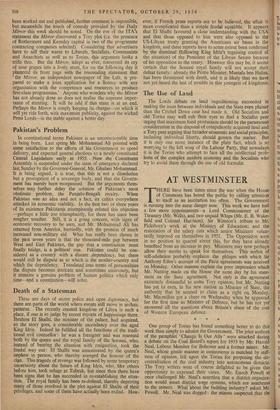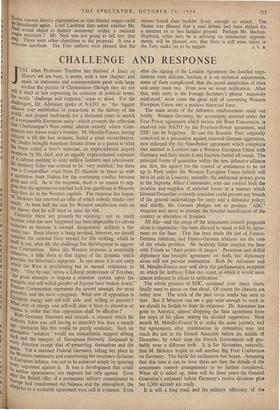AT WESTMINSTER
THERE have been times since the war when the House of Commons has bored the public by calling attention to itself as an institution too often. The Government is running into the same danger now. This week we have had a few more appointments—a Lord Commissioner of the Treasury (Mr. Wills), and two unpaid Whips (Mr. E. B. Wake- field and Colonel Harrison); Sir Winston's tribute to Mr. Pickthorn's work at the Ministry of Education; and the restoration of the salary cuts which senior Ministers volun- tarily imposed on themselves in 1951. The Opposition were in no position to quarrel about this, for they have already benefited from an increase in pay. Ministers may now perhaps allow their merits to speak for themselves. This surfeit of self-adulation probably explains the phlegm with which Sir Anthony Eden's account of the Paris agreements was received on Monday. Other reasons explain the poor impression which Mr. Nutting made on the House the same day by his state- ment on the Suez agreement. Not only is the agreement extremely distasteful to some Tory opinion, but Mr. Nutting has yet to earn, in his new station as Minister of State, the authority that he seemed to claim as a right on Monday. Mr. Macmillan got a cheer on Wednesday when he appeared for the first time as Minister of Defence, but he has not yet answered all the questions about Britain's share of the cost of Western European defence.
« * « One group of Tories has found something better to do this • week than simply to admire the Government. The joint authors of the pamphlet ' Change Is Our Ally' were attacked during a debate on the Coal Board's report for 1953 by Mr. Harold Neal, Labour Member for Bolsover and a former miner. Mr. Neal, whose gentle manner in controversy is matched by still- ness of opinion, fell upon the Tories for proposing the de- centralisation of the coal industry into autonomous districts. The Tory writers were of course delighted to be given this opportunity to expound their views. Mr. Enoch Powell at once challenged Mr. Neal's assertion that a district organisa- tion would mean district wage systems, which are anathema to the miners. What about the building industry? asked Mr. Tories wanted district organisation so that district wages could 1311) introduced again. Lord Lambton then asked whether Mr. Neal would object to district autonomy within a national wages structure ? Mr. Neal was not going to fall into that traP. There were other objections to the proposal. It was a welcome interlude. The Tory authors were pleased that the miners found their booklet lively enough to attack. The. House was pleased that a coal debate had been shifted for a moment on to less familiar ground. Perhaps Mr. Buchan- Hepburn, when next he is advising on ministerial appoint- ments, will be pleased, too, that there is still some talent in the Tory ranks yet to be tapped.



































 Previous page
Previous page